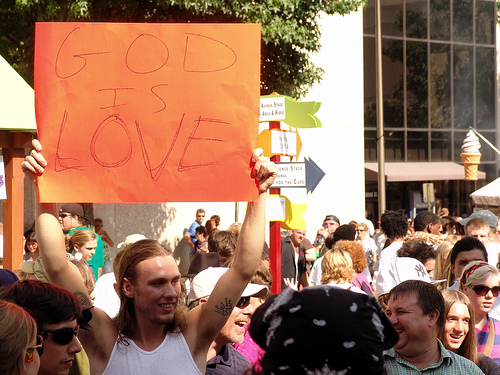We run our website the way we wished the whole internet worked: we provide high quality original content with no ads. We are funded solely by your direct support. Please consider supporting this project.
Are We Supposed to Balance Love and Truth?
Often people say, “Yes we must love. But we must balance love with truth.” “Love has its place, but we must not forget God’s wrath.” “Love must never take the place of correct biblical doctrine.”
Two points need to be made.
First, if we take seriously the biblical teaching that the love command is the greatest command, that we must put it above all other considerations, that we must clothe ourselves with and even live in love, then there can be no thought of balancing love with any other concern. Nothing can qualify a command that is “above all” other commands. (Col 3:14). If the command is to love everyone as Christ loves us, there is simply no situation in which the command does not apply.
Because the command to love is the central biblical doctrine, it is the only one we can, and must, hold in an “unbalanced” way. Put differently, the only way to be “balanced” in our understanding and practice of love is to see all other commands as aspects of it, not competitors alongside of it.
We have to wonder where anyone got the idea that love in any way competes with truth, holiness, or biblical doctrine. Love is the central biblical truth; it is the essence of all holiness; it is the most important biblical doctrine. Every truth, every deed, every teaching is reduced to nothing more than religious noise when it isn’t placed under and clothed in the commandment to love.
Second, any attempt to qualify God’s love with another attribute—God’s wrath, for example—amounts to a fundamental denial of the centrality of the revelation of God in Christ. For Christ reveals God’s holiness and wrath against sin precisely as he reveals God’s love for sinners. Indeed God’s holiness and wrath are what God’s love looks like against sin.
Love defines every aspect of the Christian’s life, for love ultimately defines every aspect of God’s life. Indeed, we may more specifically say that as Christ defines every aspect of the Christian’s life—for Christ is the definitive revelation of God’s love—so Christ defines every aspect of God’s life. All the attributes of God are to be defined by Christ. In the crucified Messiah we see God’s just and holy wrath against sin, but we see it as a manifestation of God’s love. Out of love for sinners, Christ bore our sin and suffered the wrath of God’s punishment on the cross. All that God is, dwelt in Christ (Col 2:9). Everything God does, even his expressions of holy wrath, are done out of love.
We are only balanced in our understanding of love when we understand that it is the one thing we must live in—to all people, at all times, in all situations, without exception. If we do this, everything else we need to do will get done. If we don’t do this, there’s simply nothing else worth doing.
How much harm has been done to the church and to the cause of Jesus Christ because Christians have placed other considerations alongside or above the command to love as God loves? In the name of truth, Christians in the past have sometimes destroyed people, even physically torturing and murdering them. In the name of holiness, Christians have often pushed away and shamed those who don’t meet their standard, creating their own little holiness club to which struggling sinners need not apply. And in the name of correct biblical doctrine, Christians have frequently destroyed the unity of the body of Christ, refusing to minister or worship together because of doctrinal differences, sometimes viciously attacking those who disagree with them.
The unsurpassable worth of the person who doesn’t share our truth, doesn’t meet our definition of holiness, or doesn’t agree with our “correct biblical doctrine” has all too often been neglected or denied. Which means that in such cases the truth, holiness, or correct doctrine we defended was altogether worthless: clashing cymbals, resounding gongs, religious noise, nothing more. (1 Cor 13:1-3)
—Adapted from Repenting of Religion pages 57-60.
Category: General
Tags: God is Love, Holiness, Love, Love One Another, Repenting of Religion, Truth, Wrath
Related Reading

God is Not What You Expect
Jesus came, in part, to finally reveal the absolute truth about God. He is the way and the truth (alethia) and the life (Jn 14:6). The word “truth” means “uncovered.” And what we find once God is uncovered is that he’s completely different than what we fallen humans generally expect God to be. As we…

Q&A: Condemning Sin
Q: I have a question about how you answer the rare occasions when Jesus apparently felt it necessary to publicly condemn sin: like the cleansing of the temple and his very strong judgments on Pharisees and rulers in Matthew 23. Also John the Baptist who not only preached strongly regarding public sins but was imprisoned…

A Lesson in Otherness
http://youtu.be/VeK759FF84s Long, long ago, a third grade teacher taught her class a lesson they will never forget. You won’t forget it either. This video is nearly 15 minutes long, but it’s so worth your time. Let’s love one another.

Responding in Love
The world is full of conflict where evil begets more evil. Violence produces more violence. Arguments produce more arguments. It’s a tit-for-tat world. What is God’s strategy for stopping this conflict? How does God respond to evil, and how does God call us to respond? This strategy might even come in handy during heated conversations…

How Much Are You Worth?
We know what something is worth to someone by what they are willing to pay for it. Consider, then, what our heavenly bridegroom was willing to pay to redeem us and make us his bride. Out of his love for us, the all-holy God was willing to do nothing less than to go to the…

Participating in the Divine Nature (Love)
When God created the world, it obviously wasn’t to finally have someone to love, for God already had this, within himself. Rather God created the world to express the love he is and invite others in on this love. This purpose is most beautifully expressed in Jesus’ prayer in John 17. Jesus prays to his…

